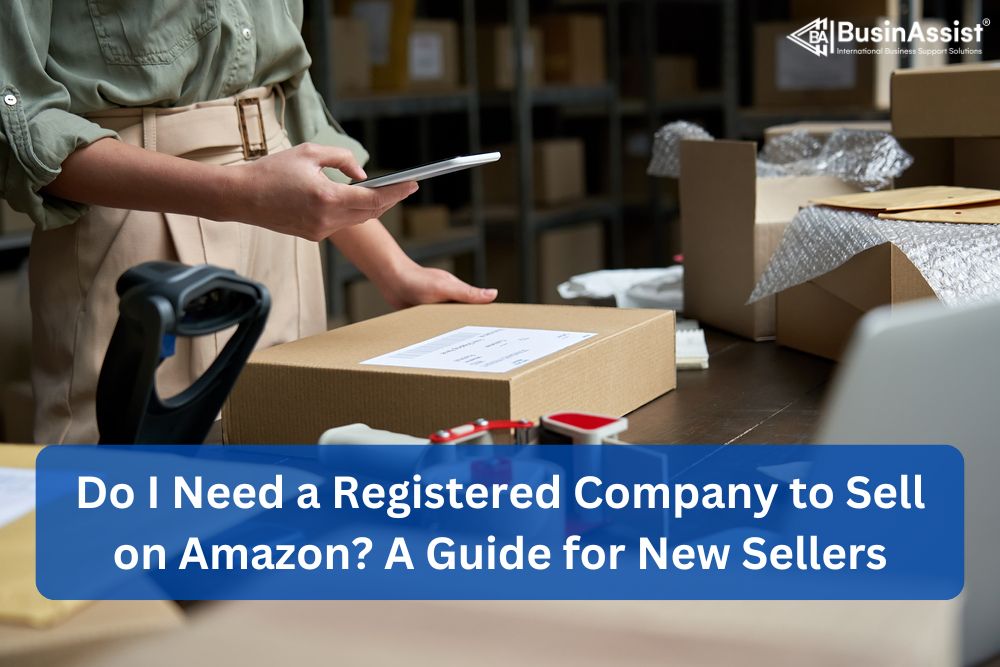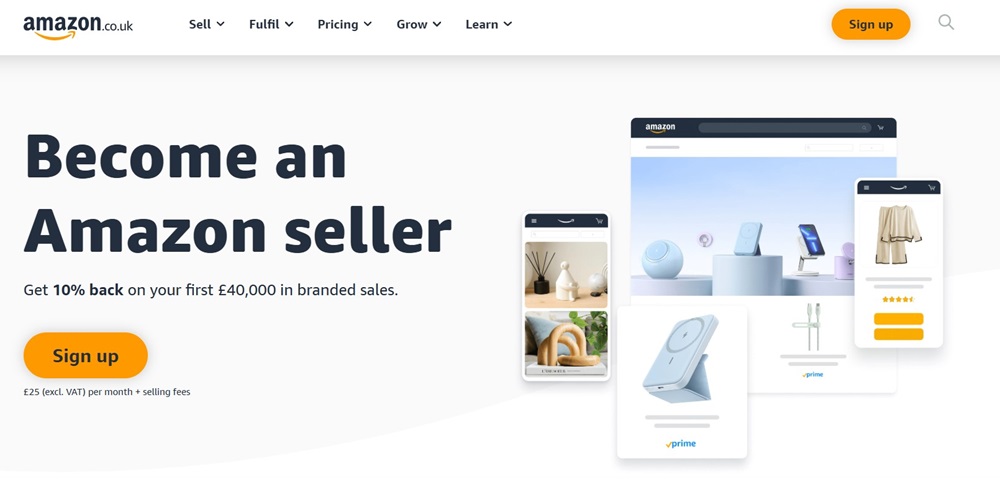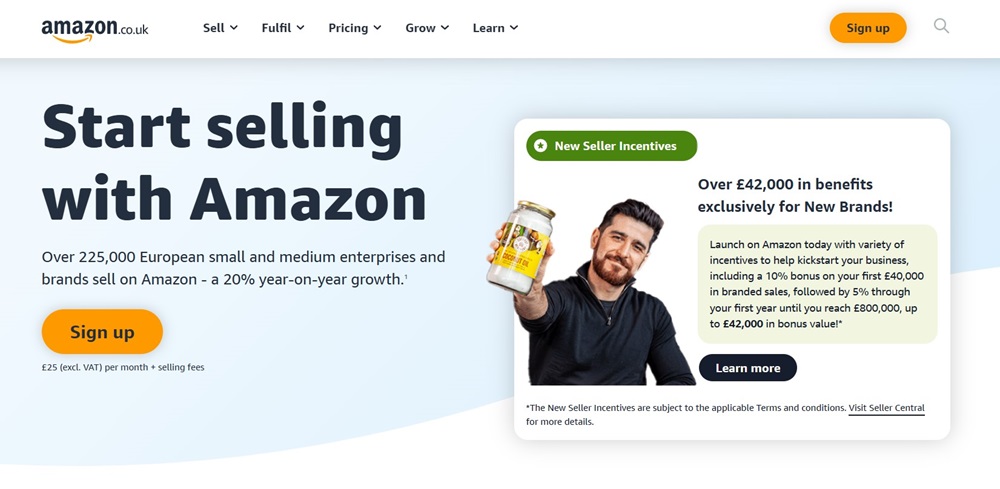Last Updated on December 17, 2025 by Joy Kyalo

With the growth of eCommerce and technology over the years, Amazon has turned out to be the go-to marketplace for many sellers who want to tap into the global market.
Do I need a registered company to sell on Amazon platform? The answer is no. Amazon is open to anyone who wants to sell as a sole trader or a limited company.
Whether you are looking to start your Amazon business in the UK as a sole trader or a limited company, this guide is for you. We will explore the dynamics of Amazon’s business, how a sole trader and a limited company can launch their business in the eCommerce platform, not forgetting how sellers can choose the right products to sell online.
Key Takeaways
- You don’t need a registered company to sell on Amazon, you can start as a sole trader or form a limited company.
- A limited company offers tax benefits, credibility, and limited liability, while sole trading is cheaper and simpler.
- Success on Amazon depends on choosing the right structure, complying with taxes, and using Amazon’s tools to grow.
An Overview of the Basics of Amazon

Amazon is an e-commerce platform among the leading Fortune 500 corporations around the world. Initially, Amazon operated as an online book-selling platform and over the years it has expanded to include a platform that sells virtually everything including, household items, clothing, gadgets, and foodstuff, and even offers services such as selling e-books and renting movies. Apart from retailing goods themselves, Amazon encourages selling to the public by opening its platform for third parties to put up products which makes it much richer in offerings.
The Prime membership service provides various advantages to its subscribers, which include free delivery within two business days, on-demand video and audio streaming (Prime Video and Prime Music), special discounts and offers, and signing them up for sales before everyone else. In a number of countries, Prime is offered but varies depending on the local population’s needs.
The friendly interface of the platform is appreciated by both the sellers and the consumers, encouraging millions to participate in online business activity. As a result, a significant number of individuals operate Amazon businesses as a secondary source of income, complementing their main earnings. To participate in selling on Amazon, all that is required is to register for an account and commence sales.
Selling on Amazon as a Sole Trader
In the UK, sole trading and selling on Amazon entails a number of steps from setting up a seller account to handling business finances.
A sole trader is someone who runs their own business and is also in charge of the business operations. A sole trader can enjoy all profit obtained but also holds complete liability for any loss the business incurs. This structure promotes ease of management of business operations since the seller has complete authority over his/her goods, prices offered to customers and their relationship with clients.
Do I need a company to sell on Amazon? It is not a must for a sole trader to set up a UK limited company to commence selling on Amazon in the UK, but he/she will be required to register with HMRC. Additionally, when selling on Amazon as a sole trader, one must be familiar with the marketplace’s policies, including tax compliance and consumer protection law adherence.
This is particularly suitable for those who wish to build an online business without incurring significant costs at the beginning while allowing them to create a brand for themselves and connect with their consumers directly.
Selling on Amazon as a UK limited company
Incorporating a UK limited company to operate on Amazon primarily revolves around a few major steps. This type of structure projects a professional outlook, offers a few tax benefits, and limits the liability of the owners. If you’re wondering, Do I Need a Registered Company to Sell on Amazon? having a registered company can enhance credibility and provide significant advantages for your business.
Pro Tip: Start Small, Scale Smart
If you’re new to Amazon, begin as a sole trader to keep costs low and test the market. Once your sales grow, consider switching to a UK limited company for better tax efficiency, credibility, and limited liability protection. This way, you balance flexibility with long-term business security.
In addition to these considerations, to be an Amazon seller, business owners also need to ensure company registration with Companies House, opening a separate business account, and ensure tax compliance. What’s more, it is necessary to understand how internally, Amazon seller policies and listing optimisations where applicable affect sales.
A limited company offers limited liability to directors and shareholders, meaning the business assets or finances are separate from the owners if any financial difficulties arise.
Corporation tax is the tax a limited company pays, and it’s lower than personal income tax. Limited companies have different tax deductibles. The amount of corporate tax you remit can be lower.
What are the benefits of selling on Amazon?
Large customer base:
Amazon possesses an enormous and varied customer base, enabling the sellers to reach out to various buyers across the globe. Such a wide canvas can result in higher sales opportunities which may be difficult to accomplish using other means.
Trust and credibility:
Being one of the most well-known e-commerce platforms in the world today, Amazon adds value to its sellers. For this reason, customers often feel safe buying goods through Amazon which in turn, improves the chances of making sales for the sellers.
Fulfillment by Amazon (FBA):
With the use of FBA, sellers can take advantage of the Amazon logistics system. This includes warehouses and melters which allow the sellers to offer Amazon Prime shipping services thus attracting more customers and making the shopping experience better.
Ease of use:
Creating a seller account on Amazon is relatively easy, and the site offers an easier way to keep track of lists, inventory, and all sales. This allows both novice and proficient sellers to use the site without fear.
Marketing and advertising tools:
Amazon has a range of in-built advertising features like sponsored products and sponsored Brands to help merchants market their products and enhance their visibility. Through these advertising campaigns, users can accurately aim their ads at particular groups of customers.
Data and analytics:
One of the advantages offered to the sellers by Amazon is the provision of useful data and analytical tools that assist in tracking sales performance, customer behavior, and market trends. This information is useful in decision-making as well as in formulating marketing strategies.
Multiple selling formats:
The sellers can decide on several different selling options such as retail arbitrage, wholesale, private label, and handmade products. This provides sellers with the opportunity to select the model that suits their aspirations and wish
Mobile optimisation:
The mobile version of the device, published, is all mobile enabling customers who wish to make their purchases using their phones to the female siders. This is very important given the fact that mobile commerce continues expanding.
Global expansion opportunities:
The sellers can sell their products to customers based in other countries through the Global Selling program offered by Amazon. This makes it possible to grow the business outside the confines of the domestic market.
Built-in payment processing:
Amazon takes care of processing payments and hence it reduces the stress on the sellers. This is to say that the sellers do not need to concern themselves with creating merchant account facilities and resolving any issues that arise with payments.
Access to customer review system:
Positive customer feedback on e-commerce platforms like Amazon can be a considerable motivator for product sales. A good review encouragement system will enhance the product’s visibility and credibility, which is very important in winning new customers.
Support and resources:
Amazon offers a variety of tools and resources such as seller support, educational materials, and regional seller forums. With the help of these resources, sellers can identify the problems and refine their selling techniques.
Quick start-up:
E-commerce portals of established service providers like Amazon ease the burden of weak logistical backend support and it is no doubt a subjective cause for sellers opting for registration and selling as opposed to building their e-commerce in Hillsborough County.
Diverse product categories:
Sellers can choose from multiple product categories, enabling flexibility in product selection and diversification of offerings.
What are the steps of starting a business on Amazon?

Here are the steps to help you launch your business on Amazon as a sole trader:
1. Register as a sole trader or a limited company
If you want to launch your business as a sole trader, you need to register as self-employed with HM Revenue and Customs (HMRC) if you earn more than £1,000 from self-employment. This can usually be done online. Additionally, as a sole trader, you’ll need to pay Class 2 and Class 4 National Insurance contributions depending on your profits.
As a limited company, you will need to incorporate your UK company with Companies House. This can be done on their website or a company formation agent can help you incorporate the company on your behalf.
2. Set up your Amazon seller account
Choose your selling plan which includes:
Individual plan: No monthly fee but a £0.75 fee per item sold. Good for low-volume sellers.
Professional plan: Costs £25 per month and is ideal for those selling over 35 items per month. It offers advanced selling tools and access to additional features.
Account registration: Go to Amazon Seller Central and follow the prompts to create your account. You’ll need information such as your business name, address, email, and bank details.
3. Product sourcing and listing
Identify a niche or specific products you wish to sell. Ensure there is a demand by researching competitors and market trends. Create listings with detailed descriptions, high-quality images, and competitive pricing. Utilise keywords to optimise your listings for search.
4. Choose a fulfillment method
Fulfilled by Merchant (FBM) means that you handle the storage, packing, and shipping of products. Fulfilled by Amazon (FBA) means that Amazon handles storage, packing, and shipping, and offers benefits like Amazon Prime eligibility.
5. Managing finances
Maintain thorough records of income and expenses. This includes sales, costs of goods sold, Amazon fees, and any business-related expenses. Separate business and personal accounts by opening a separate bank account for your business to simplify accounting.
6. Understand tax obligations
At the end of the tax year (April 5th), you’ll need to complete a self-assessment tax return, reporting your income and paying any necessary taxes. If your taxable turnover exceeds £85,000, you must register for VAT and charge it on your sales.
7. Customer service and managing reviews
Provide excellent customer service to maintain a good seller rating. Respond promptly to customer inquiries and resolve issues efficiently. Encourage satisfied customers to leave positive reviews, as this can significantly impact your sales.
8. Marketing and promotion
Use Amazon’s advertising options like Sponsored Products and Sponsored Brands to boost visibility. Utilize social media, email marketing, and other channels to drive traffic to your listings.
9. Analysing performance
Regularly review your sales data, customer feedback, and performance metrics on Amazon Seller Central. This will help you identify improvement areas and adjust your strategy accordingly.
10. Stay compliant with Amazon policies
Familiarise yourself with Amazon’s policies to ensure compliance. This includes product restrictions, customer return policies, and fulfillment guidelines.
Do I need a registered company to sell on Amazon? You do not need a company to register your business to start selling on Amazon. You can sell on Amazon as a sole trader, but forming a UK limited company can enhance professionalism and provide added benefits like limited liability and tax advantages.
FAQs
Q: Is Amazon a good company to work for?
Ans: Whether Amazon is a good company to work for will depend on various factors such as location and personal expectations. However, Amazon is known for its competitive compensation and benefits and career growth opportunities that promote internal talent.
Q: What delivery company does Amazon use?
Ans: Amazon uses a variety of delivery methods such as the Delivery Service Partner (DSP) program, which involves hundreds of small businesses and numerous drivers. These partners carry out the “last mile” delivery by utilising Amazon-branded vans and technology, that is from the local delivery stations to the customers’ doors. Last-mile delivery is also done using Amazon Air, a network of their cargo jets, and they are also testing out Prime Air, a service where packages are delivered by drones, in a bid to enhance their delivery systems.
Q: Can I open an Amazon seller account without a company?
Ans: Yes, one can create an Amazon seller account without registering a business. One can enroll on Amazon as an individual seller which is very practical in case where one is a beginner or seeking to transact a few items.
Q: Can I sell another company’s product on Amazon?
Ans: Yes, you can promote and sell another company’s goods on Amazon by a method known as ‘reselling’ or ‘retail arbitrage’. Just make sure you have the requisite rights or contracts with the original manufacturer or brand owner where such goods are protected by trademark.
Q: Does Amazon deliver for other companies?
Ans: Yes, Amazon does logistics and delivery for other companies as well. In this case, the company has a service called Amazon Logistics which is engaged in delivery and fulfillment services of outside businesses as well. This entails running warehouse operations, organising transportation, and even going providing a last mile delivery to customers.
Read Also:
- How to Fill Out a Stock Transfer Form J30: A Step-by-Step Guide
- How to Find Trending Products on E-commerce Marketplaces: A Guide for Online Sellers
- How Much Do Amazon Sellers Make in the UK? An In-Depth Analysis
- How to Start Selling Products Online from Home: A Beginner’s Guide
- Best eCommerce Platforms for Small Businesses in the UK
- Start a UK Company: A Simple Guide from Idea to Setup (2025 Edition)
- When Do I Need to Register My Business with HMRC? A Guide for New Entrepreneurs
- Do I Need a Registered Business to Sell on Etsy? A Simple Guide for Beginners
- Do Private Individuals Need an EORI Number? How to Get One Explained

Joy is a content writer at BusinAssist with 6+ years of experience in content marketing and social media strategy. She specialises in company formation and virtual operations, guiding entrepreneurs through global markets with clarity, drawing on her marketing and PR background. Business Assist with BusinAssist – your business success partner.

